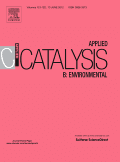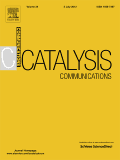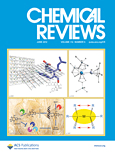
Applied Catalysis B-Environment and Energy
metrics 2024
Advancing sustainable solutions for a greener tomorrow.
Introduction
Applied Catalysis B-Environment and Energy, published by Elsevier, is a leading journal in the fields of catalysis, environmental science, and process chemistry, with an impressive impact factor that reflects its significance in advancing research and innovation. Established in 1992, this esteemed journal has earned a prestigious status as evidenced by its 2023 category quartiles—ranking in the Q1 category for Catalysis, Environmental Science, and Process Chemistry and Technology. With consistently high rankings in the Scopus database, it holds a remarkable position as #1 in General Environmental Science and #2 in both Process Chemistry and Catalysis, showcasing its profound impact on the respective fields. The journal’s scope encompasses both theoretical and practical research, targeting the pivotal developments in catalysis that promote sustainable practices and energy efficiency. Researchers, professionals, and students alike will find invaluable insights and cutting-edge studies published within its pages, making it an essential resource for those invested in pioneering advancements for a greener, more energy-efficient future.
Metrics 2024
 5.11
5.11 20.20
20.20 18.90
18.90 328
328Metrics History
Rank 2024
Scopus
IF (Web Of Science)
JCI (Web Of Science)
Quartile History
Similar Journals

CATALYSIS COMMUNICATIONS
Pioneering Discoveries in Chemical EngineeringCATALYSIS COMMUNICATIONS is a prestigious journal published by Elsevier, focusing on advancements in the field of catalysis, an essential component of chemical engineering and process technology. With an ISSN of 1566-7367 and an E-ISSN of 1873-3905, this journal is dedicated to the rapid publication of original research and innovative findings that drive progress in catalysis. Recognized for its quality, CATALYSIS COMMUNICATIONS holds a Q2 ranking within the categories of Catalysis, Chemistry (miscellaneous), and Process Chemistry and Technology as of 2023, positioning itself in the upper tier of scholarly publications in its field. The journal has made significant contributions to the scientific community since its inception in 2000, with ongoing research until 2024. While it currently operates without an open-access option, the platform ensures rigorous peer review, maintaining high standards for publication. By engaging with the latest research, CATALYSIS COMMUNICATIONS serves as a vital resource for researchers, professionals, and students, fostering innovation and collaboration in chemical sciences.

APPLIED CATALYSIS A-GENERAL
Elevating Knowledge in Catalysis and Process Engineering.Applied Catalysis A-General is a premier journal published by Elsevier that serves as a vital resource in the fields of catalysis, process chemistry, and technology. Founded in 1991, this esteemed journal has garnered considerable recognition, reflected in its classification in the Q2 quartile for both catalysis and process chemistry in 2023, as well as its notable rankings within the Scopus database, placing it among the top 20 journals in related disciplines. With an ISSN of 0926-860X and an E-ISSN of 1873-3875, the journal provides a platform for researchers and professionals to disseminate cutting-edge research findings, facilitate knowledge transfer, and foster innovation in the field. While not an open-access journal, it remains accessible through institutional subscriptions, ensuring that critical findings reach a broad audience. The journal's objectives include advancing the understanding of catalytic processes and their applications, making it an indispensable tool for those engaged in this dynamic area of study. Applied Catalysis A-General continues to play a vital role in shaping the future of catalysis, contributing to both scientific progression and practical advancements in various industries.

Catalysis in Industry
Catalyzing knowledge for industrial breakthroughs.Catalysis in Industry, published by MAIK NAUKA-INTERPERIODICA, is a pivotal journal in the field of chemical engineering and catalysis. With its ISSN 2070-0504 and E-ISSN 2070-0555, this journal has been dedicated to advancing the understanding and application of catalytic processes in industrial settings since its inception in 2010. Despite its Q4 ranking in the category of Catalysis as of 2023 and a Scopus rank of #61/68, the journal serves as a valuable platform for researchers and practitioners to disseminate innovative ideas and findings that contribute to the evolution of catalysis technology. Published in Russia, Catalysis in Industry aims to bridge the gap between academic research and industrial practice, providing Open Access options to facilitate widespread accessibility and encourage a collaborative approach to chemical engineering challenges. As the industry grapples with the demand for sustainable solutions and efficient processes, this journal remains a critical resource for the academic community, aspiring professionals, and students eager to deepen their knowledge in catalytic applications.

RESEARCH ON CHEMICAL INTERMEDIATES
Illuminating Pathways in Chemical IntermediatesRESEARCH ON CHEMICAL INTERMEDIATES, published by Springer, is a prestigious academic journal that has been contributing to the field of chemistry since 1984. With an ISSN of 0922-6168 and an E-ISSN of 1568-5675, this journal serves as a vital platform for the dissemination of innovative findings and research advancements related to chemical intermediates. Situated in the Netherlands, it has established a commendable reputation, currently ranked in the Q2 category for miscellaneous chemistry and positioned at #131/408 with a 68th percentile in the Scopus rankings. Though it does not operate under an open-access model, the journal plays a crucial role in connecting scientists, researchers, and practitioners to facilitate a better understanding of synthetic methods, characterizations, and applications of various chemical intermediates. Continually publishing high-quality research until its anticipated convergence in 2024, this journal is an essential resource for those looking to expand their knowledge and contribute to the vibrant community of chemical science.

TRANSACTIONS OF TIANJIN UNIVERSITY
Connecting scholars to drive impactful research forward.TRANSACTIONS OF TIANJIN UNIVERSITY, published by SpringerNature, is a premier journal in the field of multidisciplinary research, boasting an impressive Q1 ranking and placing within the top 93rd percentile of its category according to Scopus. With an ISSN of 1006-4982 and E-ISSN of 1995-8196, this journal facilitates insightful and innovative contributions that span various disciplines, making it a vital resource for academics and professionals alike. Established in 2004, the journal continues to thrive with a commitment to advancing knowledge and fostering collaboration in scientific inquiry. TRANSACTIONS OF TIANJIN UNIVERSITY aligns with global research trends and offers a platform for the dissemination of high-quality research findings, promoting interdisciplinary approaches to solving complex problems. Located in China, its influence extends well beyond national borders, appealing to a diverse readership eager to explore the latest advancements and discussions in the multidisciplinary arena.

Catalysts
Elevating the Science of Catalysis through CollaborationCatalysts is a leading academic journal in the field of catalysis, published by MDPI since 2011 and well-regarded for its commitment to open access publishing. Based in Switzerland, this journal delivers innovative research and reviews that span various aspects of catalysis, from heterogeneous and homogeneous catalysis to the development of novel catalytic systems. With a commendable impact factor and a notable Q2 ranking in both Catalysis and Physical and Theoretical Chemistry categories, Catalysts plays a critical role in advancing the scientific discourse in these fields. The open-access model ensures that all research articles are readily accessible to researchers and professionals worldwide, fostering collaboration and accessibility to high-quality scientific literature. As the journal continues to publish cutting-edge studies up to its convergence in 2024, it remains an essential resource for anyone involved in catalysis research, from seasoned professionals to emerging scholars.

Reactions
Exploring the Frontiers of Chemical InnovationReactions is a dynamic open-access journal published by MDPI, dedicated to the advancement of research in the fields of Chemical Engineering and Chemistry. Launched in 2020, the journal aims to provide a platform for scientists and researchers to share their findings and innovations, facilitating the synthesis and dissemination of knowledge within the global academic community. With an impact factor that reflects its growing influence, Reactions ranks 47th in the Chemical Engineering category and 72nd in Chemistry on Scopus, placing it within the vibrant landscape of contemporary chemical research. Housed in the picturesque city of Basel, Switzerland, the journal is committed to open access, ensuring that its high-quality content is readily available to all. This commitment not only enhances visibility but also fosters collaboration among researchers, professionals, and students striving to push the boundaries of chemical sciences. As we look towards 2024 and beyond, Reactions continues to encourage submissions that explore groundbreaking methodologies, innovative applications, and transformative theoretical frameworks in chemistry and chemical engineering.

KINETICS AND CATALYSIS
Innovating Through Interdisciplinary ResearchKinetics and Catalysis is a pioneering journal dedicated to advancing the field of catalytic science and chemical kinetics, published by Pleiades Publishing Inc. Based in the Russian Federation, this journal serves as a critical platform for disseminating high-quality research related to the mechanisms of chemical reactions and innovative catalytic processes. Although currently not an open access journal, it maintains academic rigor through a comprehensive peer-review process that ensures the relevance and integrity of its published works. With a history dating back to 1968, Kinetics and Catalysis has evolved through various converged years, reflecting its commitment to interdisciplinary research within the realms of chemistry, catalysis, and the computational aspects of modeling and simulation. As evidenced by its Scopus rankings and quartiles, it stands as an influential, albeit niche, journal, appealing to researchers, professionals, and students eager to explore the intricacies of chemical transformations. The journal’s robust archive offers an invaluable resource for those seeking to expand their understanding of both theoretical and practical approaches to catalysis.

Green Synthesis and Catalysis
Transforming Biotechnology with Sustainable SynthesisGreen Synthesis and Catalysis is a pioneering Open Access journal dedicated to advancing the fields of biotechnology and catalysis, published by KEAI PUBLISHING LTD since 2020. With an impressive Q1 ranking in both Biotechnology and Catalysis and notable Scopus rankings placing it in the top echelons of its categories, this journal serves as a critical platform for researchers and professionals dedicated to innovative and sustainable chemical practices. The journal addresses the pressing need for environmentally-friendly synthesis methods and efficient catalytic processes that align with global sustainability goals. Based in Beijing, China, it offers a wealth of peer-reviewed articles, reviews, and cutting-edge research focusing on green technologies and practices. Academics and practitioners alike can benefit from the journal's wide-ranging scope that promises to push the boundaries of current scientific understanding and application. Engage with the latest discoveries by accessing the journal’s enriching content online, and contribute to the transformative dialogue surrounding sustainable synthesis and catalytic innovation.

CHEMICAL REVIEWS
Charting the Course for Future Chemical Discoveries.Chemical Reviews, published by the American Chemical Society, is a leading journal in the field of chemistry, renowned for its comprehensive and authoritative reviews on a wide range of chemical topics. With its ISSN 0009-2665 and E-ISSN 1520-6890, this prestigious journal has maintained a remarkable trajectory since its inception in 1924, continuously contributing to advancements in the chemical sciences. As a Q1 journal in the Chemistry (miscellaneous) category, it stands at the forefront of research, boasting an impressive Scopus rank of #1 out of 408 in the field of General Chemistry, positioning it within the top 1% of the field. Chemical Reviews offers invaluable insights and serves as a critical resource for researchers, professionals, and students alike, facilitating knowledge exchange and fostering innovation in chemistry. While currently not open access, it remains a vital component of the scientific community, gathering an extensive readership base eager for the latest developments, methodologies, and theoretical frameworks in this dynamic discipline.